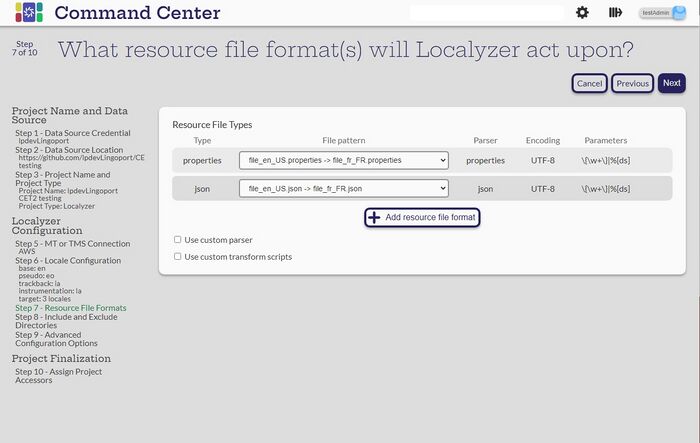Difference between revisions of "Resource File(s) Format"
(→Introduction) |
|||
| Line 15: | Line 15: | ||
[[What are the Localyzer locales |<== Back to Step 6: What are the Localyzer locales?]] |
[[What are the Localyzer locales |<== Back to Step 6: What are the Localyzer locales?]] |
||
| + | |||
== Using Custom Resource File Types == |
== Using Custom Resource File Types == |
||
| + | |||
| + | In the event that the file types and patterns in your repository don’t match any of the existing options, custom resource types can be configured. To add a custom resource file type, select the “Add resource file format” button and choose the “custom” option. Once added, a new row with many options to customize will appear |
||
=== File Name Pattern === |
=== File Name Pattern === |
||
Revision as of 22:09, 13 September 2023
Contents
Introduction
- Select the Resource File Types that are to be translated. Verify that the file pattern is correct.
For example if the base resource file is resource.properties, then the file pattern should be file.properties -> file_fr_FR.properties.
If the base resource file is resource_en_US.properties then the file pattern should be file_en_US.properties -> file_fr_FR.properties.
- Select Use XML parser file or Use custom transform scripts if there are already appropriate files defined in the Setting -> System Files -> XML Parser Files or Transform Folders
Select Next
Step 8: Set up optional include or exclude patterns
<== Back to Step 6: What are the Localyzer locales?
Using Custom Resource File Types
In the event that the file types and patterns in your repository don’t match any of the existing options, custom resource types can be configured. To add a custom resource file type, select the “Add resource file format” button and choose the “custom” option. Once added, a new row with many options to customize will appear
